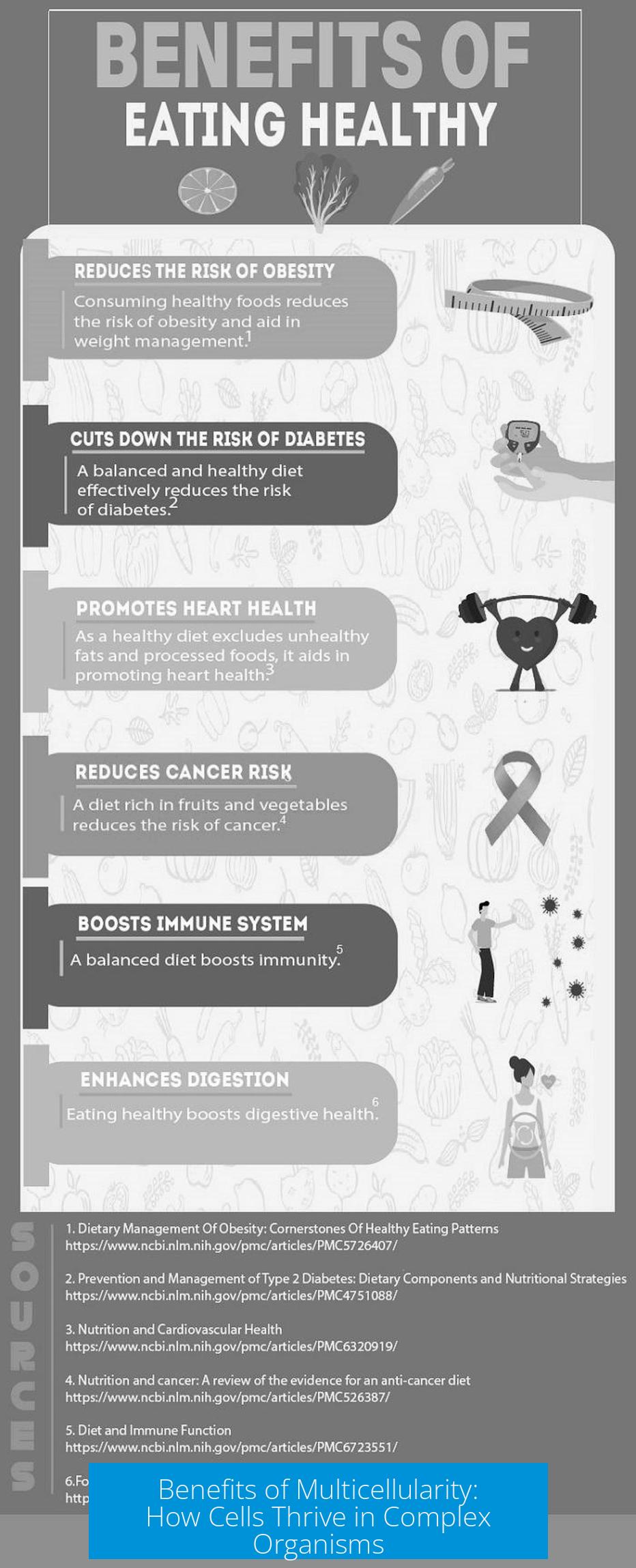Benefits for Cells in Multicellular Organisms

Cells in multicellular organisms gain distinct advantages, including reduced workload, improved protection, and enhanced efficiency through specialization. This setup supports cell survival and organismal complexity.
Reduced Cellular Workload via Specialization

Multicellular life allows cells to specialize in specific tasks. This reduces the individual cell’s burden, enabling it to perform fewer functions but more effectively. Specialization lets cells focus on roles like nutrient absorption, signal transmission, or defense.
Protection Through Grouping

Being grouped together offers cells protection against environmental hazards. Early multicellular clusters had better survival rates than solitary cells. This collective arrangement increased chances of passing on genetic material across generations.
Enhanced Efficiency and Functional Division
Specialization increases the overall efficiency of the organism. Cells dedicated to perception, movement, or defense optimize these functions. Though this benefit arose after many evolutionary steps, it remains key to complex life.
Genetic Advantages and Evolutionary Sacrifices
Cells contribute to the organism’s genome continuity by supporting reproduction. While individual cells may live longer within the organism, their own direct lineage ends when the organism dies.
- Cells cooperate, sharing nearly identical genomes.
- Individual cells sacrifice independence for the colony’s success.
- Similar to social insects where workers support reproductive individuals.
Early Multicellularity Example
The sea sponge provides an evolutionary model for multicellularity. Studies show it exhibits core features like cell adhesion and communication, highlighting benefits early in multicellular evolution. More details are available in this paper.
Key Takeaways
- Specialization reduces cell workload and enhances function.
- Cell grouping offers physical protection and survival advantages.
- Multicellularity improves organism efficiency via functional division.
- Cells gain genetic significance but lose independent reproduction.
- Multicellularity evolved through many mutations and trade-offs.
Why Being Part of a Multicellular Organism Is a Big Win for Cells
So, what are the benefits for cells in multicellular organisms? Simply put, cells enjoy reduced workload, increased protection, and efficient division of labor through specialization, all while contributing to a bigger evolutionary picture. Let’s peel back the layers and see why cells are happier in a team than solo.
Imagine cells before multicellularity. Each had to do everything: eat, defend, reproduce, and signal. That’s a lot! When cells banded together, life became easier. It’s like moving from a one-person band to a full orchestra. Suddenly, you don’t have to blow the trumpet and play the drums at once.
1. Cellular Workload Reduction Through Specialization
One clear perk for cells in multicellular creatures is specialization, which cuts down each cell’s to-do list dramatically. Instead of juggling every task, certain cells become experts in one job. Some handle sensing light, others guard against threats, while a different crew manages energy. This division means less chaos and more efficiency.
It’s like working in a team project: when one person focuses on research while another does the presentation, tasks become smoother and less stressful.
2. Protection by Grouping: Safety in Numbers
Cells in groups have an obvious benefit—protection! Early on, simply sticking together helped cells dodge dangers more easily. Think of it as neighborhood watch but on a microscopic scale, where cells shielded each other from harm.
This protective clustering gave rise to better survival rates. Those groups thrived, passed on this “sticking together” habit, and over millions of years evolved into organisms with specialized cells ready to tackle different challenges.
3. Increased Efficiency Through Specialization: More Than Just a Perk
Specialization didn’t pop up overnight. It was slow, requiring many mutations and trial-and-error evolutionary steps.
Once established, it turbo-charged efficiency across the board. Consider how some cells dedicate themselves to perception—like nerve cells sensing light or sound—and others serve as defenders to keep the body safe.
This fine-tuning lets multicellular organisms react faster and smarter to their surroundings. Instead of every cell playing defense, defenders defend. Instead of every cell trying to sense light, sensory cells do their job better than any generalist could.
4. Genetic Benefits—And Sacrifices—for Individual Cells
Here’s a twist: While individual cells gain by supporting the organism, they also sacrifice something big—direct reproduction.
In multicellular life, many cells give up their solo act in passing down genes directly. Instead, they share their genome with countless sibling cells in the organism. When the organism reproduces, it’s like the whole cell team passes the torch together.
From an evolutionary viewpoint, many cells are “dead ends” because they can’t reproduce after the organism’s death. Yet they contribute by ensuring that related cells pass on their genes effectively.
This phenomenon mirrors ant colonies. Worker ants sacrifice their own reproduction to support a queen, ensuring gene survival through her offspring. Similarly, cells work for the greater good.
Proof in the Primitive Pudding: Lessons from Sea Sponges
Curious about the roots of multicellularity? The sea sponge is a stellar example. Research published in Nature explores its early multicellular traits.
These creatures highlight how simple cells first began cooperating, setting the stage for the dazzling complexity we see in modern multicellular life. The sponge’s cells, though basic, show early specialization and teamwork, supporting the idea that benefits for cells come from unity and role division.
Practical Takeaways: What Can We Learn from Cellular Teamwork?
- From Efficiency to Innovation: Just like cells, focusing on specific strengths at work or in life cuts unnecessary strain and improves results.
- Protection in Numbers Matters: Grouping up isn’t just a workplace cliché; it’s key to survival, whether cells or humans.
- Understand Sacrifices for the Greater Good: Sometimes, sacrificing individual gain leads to bigger, shared success.
So, next time you think about cells, picture a vibrant community where each member plays a role, sometimes tough, sometimes rewarding. Their collaboration is why multicellular organisms can soar—whether it’s us humans, trees, or sea sponges.
What’s Your Take on Cellular Teamwork?
Does dividing tasks make life easier in your world? How do you balance specialization without feeling stuck? Think of cells—tiny but mighty team players. Multicellularity isn’t just biology; it’s a story of cooperation, survival, and trade-offs all rolled into one. And, no, no one cell is more special—they are all part of a smart, hardworking squad.
What advantage do cells gain by specializing in multicellular organisms?
Cells that specialize handle fewer tasks. This lowers their workload, letting them focus on one function. Specialization makes cells more efficient at their job than if they had to do multiple tasks.
How does grouping in multicellular organisms protect individual cells?
Being together keeps cells safer early on. Grouping shields cells from harm, improving survival chances. This protection helped cells pass traits for group living to future generations.
Do cells in multicellular organisms benefit genetically by cooperating?
Yes, cells share nearly the same genome and can pass it on collectively. They help each other reproduce new colonies. But individual cells often sacrifice their own reproduction for the group’s success.
Why is specialization considered an evolutionary trade-off for individual cells?
Specialized cells may live longer but usually stop directly reproducing. Their genetic legacy depends on the entire organism’s survival. This limits the cells’ own independent evolutionary future.
How did specialization evolve in multicellular organisms?
Specialization appeared after many mutations. It allowed cells to focus on functions like sensing or defense. Over time, this increased the efficiency and complexity of organisms.





Leave a Comment